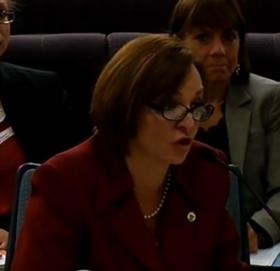
Credit Florida Channel / Florida Channel
CLICK THROUGH TO LISTEN
By Stan Jastrzebski
Florida’s Department of Children and Families is a step closer to adding an official who’d be tasked with reducing the number of children who die after coming into contact with the agency. Two bills and a stack of amendments aimed at doing that were folded together Wednesday, but critics say they’re not sure how much it would cost or if the requirements for the new job are fully formed.
The new job title would be Assistant Secretary for Child Welfare – a job that sounded even more necessary after the Miami Herald showed nearly 500 kids who’d had contact with DCF have died.
“I spoke at Senator Sobel’s hearing a few months ago and asked ‘Where is the outrage at 24 deaths,’ asked Patrick McCabe, a Miami foster parent who’s given temporary shelter to some 70 kids in the last few years. “Now, after the investigative series by the Herald which, I’m grateful is allowed to even happen in the state because of the sunshine law, so I commend you for that. But now, after 477 deaths, where is the moral outrage at this problem?”
Sen. Eleanor Sobel (D-Hollywood) authored the legislation, which she says could help rehabilitate the state’s child welfare system – and the image of lawmakers who didn’t give it enough oversight in the past.
“Many of you know that I was a special ed teacher and a social studies teacher and an English teacher,” Sobel says. “If I had to give the past performance a grade, I would give it a D for our performance. But I think we are heading in the right direction and we’re close to getting to an A, so I’d say we get an A-, because we really haven’t talked about funding.”
Sobel’s bill would also create an organization known as the Florida Institute for Child Welfare, but the legislation doesn’t specify how much that might cost. Public testimony from parties to the child welfare system estimated the number could be as large as $25 million.
Lawmakers are already pushing to allow DCF to spend more money hiring additional child protective investigators, or CPIs. The new hires would be required to hold degrees in social work.
“No measures put into law will make a difference unless we have enough protective investigators take time investigating the families and analyzing the situations in order to make the appropriate decisions,” says DCF Interim Secretary Esther Jacobo.
But Sen. Audrey Gibson (D-Jacksonville) noted an apparent disconnect between what the state is looking for in a CPI and the background of the assistant secretary Sobel’s bill would create.
“There doesn’t seem to be in the bill that there’s a requirement for a degree,” Gibson says. “Yet the CPIs and the supervisors have to have a degree. The assistant secretary only needs seven years of experience. I’m just wondering how we kind of get to just experience, no degree.”
Other states, including Oregon, have also beefed up their incident response frameworks in the last decade.
Click here to go to original article.

